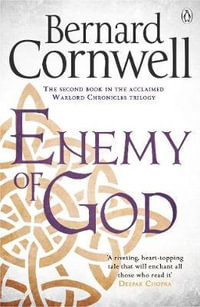
At a Glance
448 Pages
2.9 x 19.7 x 12.7
Paperback
RRP $22.99
$21.50
or 4 interest-free payments of $5.38 with
Aims to ship in 15 to 25 business days
About the Author
Bernard Cornwell is the author of the acclaimed Richard Sharpe series, set during the Napoleonic Wars; the Nathaniel Starbuck Chronicles, about American Civil War; the Warlord Trilogy, about Arthurian England; and, most recently, Stonehenge 2000 B.C.: A Novel and The Archer's Tale.
Bernard Cornwell worked for BBC TV for seven years, mostly as producer on the Nationwide programme, before taking charge of the Current Affairs department in Northern Ireland. In 1978 he became editor of Thames Television's Thames at Six. Mr. Cornwell lives with his wife on Cape Cod.
Industry Reviews
'Crackling with good deeds, fine characters and sparkling set pieces, it confirms yet again Cornwell's reputation for masterly historical novels' DAILY MAIL
'It is all spectacular, rattling good stuff: war and torture; love, lust and loss' THE TIMES
'The battle scenes, as always, are masterful; and the vignettes of everyday living, in times of extreme hardship, have the ring of simple truth' SUNDAY TELEGRAPH
'A very fine writer' ECONOMIST
The Count of Berat was old, pious and learned. He had lived sixty-five years and liked to boast that he had not left his fiefdom for the last forty of them. His stronghold was the great castle of Berat. It stood on a limestone hill above the town of Berat, which was almost surrounded by the River Berat that made the county of Berat so fertile. There were olives, grapes, pears, plums, barley and women. The Count liked them all. He had married five times, each new wife younger than the last, but none had provided him with a child. He had not even spawned a bastard on a milkmaid though, God knew, it was not for lack of trying.
That absence of children had persuaded the Count that God had cursed him and so in his old age he had surrounded himself with priests. The town had a cathedral and eighteen churches, with a bishop, canons and priests to fill them, and there was a house of Dominican friars by the east gate. The Count blessed the town with two new churches and built a convent high on the western hill across the river and beyond the vineyards. He employed a chaplain and, at great expense, he purchased a handful of the straw that had lined the manger in which the baby Jesus had been laid at his birth. The Count encased the straw in crystal, gold and gems, and placed the reliquary on the altar of the castle's chapel and prayed to it each day, but even that sacred talisman did not help. His fifth wife was seventeen and plump and healthy and, like the others, barren.
At first the Count suspected that he had been cheated in his purchase of the holy straw, but his chaplain assured him that the relic had come from the papal palace at Avignon and produced a letter signed by the Holy Father himself guaranteeing that the straw was indeed the Christ-child's bedding. Then the Count had his new wife examined by four eminent doctors and those worthies decreed that her urine was clear, her parts whole and her appetites healthy, and so the Count employed his own learning in search of an heir. Hippocrates had written of the effect of pictures on conception and so the Count ordered a painter to decorate the walls of his wife's bedchamber with pictures of the Virgin and child; he ate red beans and kept his rooms warm. Nothing worked. It was not the Count's fault, he knew that. He had planted barley seeds in two pots and watered one with his new wife's urine and one with his own, and both pots had sprouted seedlings and that, the doctors said, proved that both the Count and Countess were fertile.
Which meant, the Count had decided, that he was cursed. So he turned more avidly to religion because he knew he did not have much time left. Aristotle had written that the age of seventy was the limit of a man's ability, and so the Count had just five years to work his miracle. Then, one autumn morning, though he did not realize it at the time, his prayers were answered.
Churchmen came from Paris. Three priests and a monk arrived at Berat and they brought a letter from Louis Bessières, Cardinal and Archbishop of Livorno, Papal Legate to the Court of France, and the letter was humble, respectful and threatening. It requested that Brother Jerome, a young monk of formidable learning, be allowed to examine the records of Berat. 'It is well known to us,' the Cardinal Archbishop had written in elegant Latin, 'that you possess a great love of all manuscripts, both pagan and Christian, and so entreat you, for the love of Christ and for the furtherance of His kingdom, to allow our Brother Jerome to examine your muniments.' Which was fine, so far as it went, for the Count of Berat did indeed possess a library and a manuscript collection that was probably the most extensive in all Gascony, if not in all southern Christendom, but what the letter did not make clear was why the Cardinal Archbishop was so interested in the castle's muniments. As for the reference to pagan works, that was a threat. Refuse this request, the Cardinal Archbishop was saying, and I shall set the holy dogs of the Dominicans and the Inquisitors onto your county and they will find that the pagan works encourage heresy. Then the trials and the burnings would begin, neither of which would affect the Count directly, but there would be indulgences to buy if his soul was not to be damned. The Church had a glutton's appetite for money and everyone knew the Count of Berat was rich. So the Count did not want to offend the Cardinal Archbishop, but he did want to know why His Eminence had suddenly become interested in Berat.
Which was why the Count had summoned Father Roubert, the chief Dominican in the town of Berat, to the great hall of the castle, which had long ceased to be a place of feasting, but instead was lined with shelves on which old documents moldered and precious handwritten books were wrapped in oiled leather.
Father Roubert was just thirty-two years old. He was the son of a tanner in the town and had risen in the Church thanks to the Count's patronage. He was very tall, very stern, with black hair cut so short that it reminded the Count of the stiff-bristled brushes the armorers used to burnish the coats of mail. Father Roubert was also, this fine morning, angry. 'I have business in Castillon d'Arbizon tomorrow,' he said, 'and will need to leave within the hour if I am to reach the town in daylight.'
The Count ignored the rudeness in Father Roubert's tone. The Dominican liked to treat the Count as an equal, an impudence the Count tolerated because it amused him ..
ISBN: 9780007310326
ISBN-10: 0007310323
Series: Grail Quest
Published: 28th May 2009
Format: Paperback
Language: English
Number of Pages: 448
Audience: General Adult
Publisher: HarperCollins Publishers
Country of Publication: GB
Dimensions (cm): 2.9 x 19.7 x 12.7
Weight (kg): 0.292
Shipping
| Standard Shipping | Express Shipping | |
|---|---|---|
| Metro postcodes: | $9.99 | $14.95 |
| Regional postcodes: | $9.99 | $14.95 |
| Rural postcodes: | $9.99 | $14.95 |
How to return your order
At Booktopia, we offer hassle-free returns in accordance with our returns policy. If you wish to return an item, please get in touch with Booktopia Customer Care.
Additional postage charges may be applicable.
Defective items
If there is a problem with any of the items received for your order then the Booktopia Customer Care team is ready to assist you.
For more info please visit our Help Centre.
























